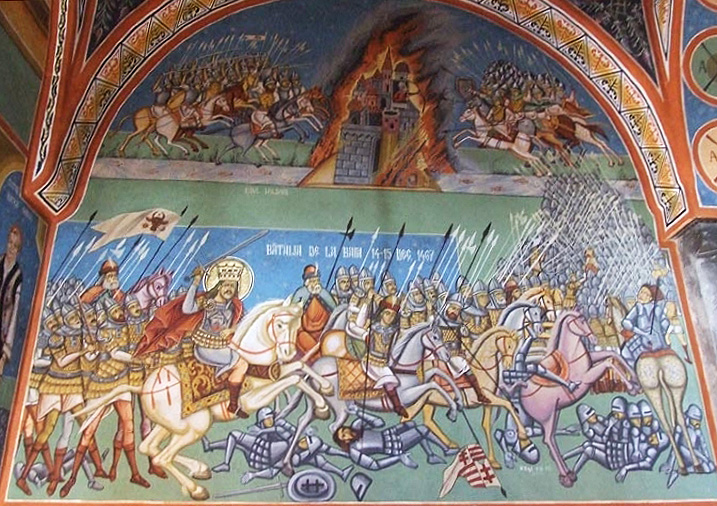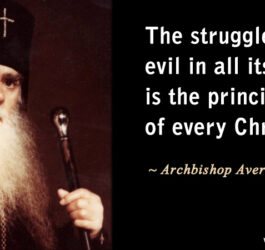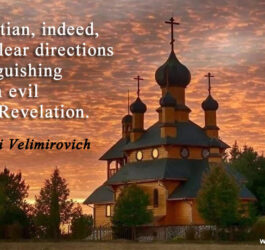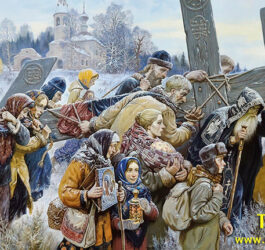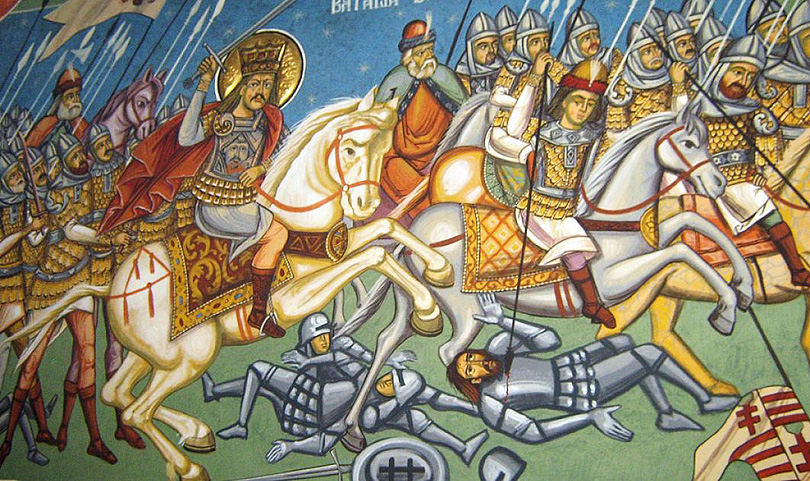 by Chris Banescu –
by Chris Banescu –
In his reflection on the Lord’s Prayer, Orthodox Christian theologian Olivier Clément reminds us that all Christians, especially Orthodox Christians, must fight against evil and the powers of darkness that assault us individually and the world we live in. This spiritual and physical warfare goes on continually and no baptized Christian should avoid or ignore it.
Clément points out that this internal and external battle against the “Evil One” (meaning Satan and all the fallen angels) must be fought both internally and externally by all Christians, including monastics, clergy, and lay men and women alike. He calls on Christians to struggle against the evil inside us and also to fight against the evil surrounding us, in our society and culture, that’s constantly being fueled by demonic forces driven by Satan whom the Scriptures identify as the “Lord of death.”
Clément assures us that every word of truth, every act of beauty, and every work of justice and compassion we do opposes the evil around us and reminds the world of Christ’s resurrection and His victory over death; a truth and reality that’s often obscured and increasingly ignored by the world.
The entire Church is engaged in this ultimate battle whose aim is not victory but rather the revelation of victory. It involves all of us, from monastics who seek out hand-to-hand combat with the powers of darkness, making monasteries and hermitages to be a kind of spiritual lighting rod for the world, to the least among us who, huddled in fear against the cross of Christ, patiently attempt, day after day, to struggle against every form of evil within us, around us, in our culture and in our society, who patiently mend the fabric of life that is being continually sundered by the one to whom the Scriptures refer as “the Lord of death.”
Every action that is pure goodness, neither ideological nor born of a sense of obligation, every act of justice and compassion, every spark of beauty, and every word of truth further wears away the crust under which Christ’s victory over the “divider” remains hidden. We must not forget that when we speak of the Evil One, it is not our neighbor that we must look, but first to ourselves.
This same teaching is reflected in the writings of other trustworthy and faithful Christians writers and apologists, including Aleksandr Solzhenitsyn and C.S. Lewis.
“One word of truth shall outweigh the whole world” declared Orthodox Christian author and Russian dissident, Alexander Solzhenitsyn, in his 1970 acceptance speech for the Nobel Prize for literature, citing an old Russian proverb. Solzhenitsyn, who was not able to deliver the speech in person because of communist persecution in the Soviet Union, encouraged writers and artists to speak the truth in order to fight against falsehood (lies) and violence. He admonished them not to be complicit in false actions but go to war against the evil in the world by bearing witness to the truth.
We shall be told: what can literature possibly do against the ruthless onslaught of open violence? But let us not forget that violence does not live alone and is not capable of living alone: it is necessarily interwoven with falsehood. Between them lies the most intimate, the deepest of natural bonds. Violence finds its only refuge in falsehood, falsehood its only support in violence. Any man who has once acclaimed violence as his METHOD must inexorably choose falsehood as his PRINCIPLE. …
And the simple step of a simple courageous man is not to partake in falsehood, not to support false actions! Let THAT enter the world, let it even reign in the world – but not with my help. But writers and artists can achieve more: they can CONQUER FALSEHOOD! In the struggle with falsehood art always did win and it always does win! Openly, irrefutably for everyone! Falsehood can hold out against much in this world, but not against art.
And no sooner will falsehood be dispersed than the nakedness of violence will be revealed in all its ugliness – and violence, decrepit, will fall.
That is why, my friends, I believe that we are able to help the world in its white-hot hour. Not by making the excuse of possessing no weapons, and not by giving ourselves over to a frivolous life – but by going to war!
Proverbs about truth are well-loved in Russian. They give steady and sometimes striking expression to the not inconsiderable harsh national experience: ONE WORD OF TRUTH SHALL OUTWEIGH THE WHOLE WORLD.
Solzhenitsyn also understood the evil that threatens all men and the internal warfare affecting all mankind. In The Gulag Archipelago, he wrote about out this spiritual battle, “the line separating good and evil” that cuts “right through every human heart.”
If only it were all so simple! If only there were evil people somewhere insidiously committing evil deeds, and it were necessary only to separate them from the rest of us and destroy them. But the line dividing good and evil cuts through the heart of every human being. And who is willing to destroy a piece of his own heart?
…
Gradually it was disclosed to me that the line separating good and evil passes not through states, nor between classes, nor between political parties either — but right through every human heart — and through all human hearts. This line shifts. Inside us, it oscillates with the years. And even within hearts overwhelmed by evil, one small bridgehead of good is retained. And even in the best of all hearts, there remains … an unuprooted small corner of evil.Since then I have come to understand the truth of all the religions of the world: They struggle with the evil inside a human being (inside every human being). It is impossible to expel evil from the world in its entirety, but it is possible to constrict it within each person.
Likewise, C.S. Lewis, one of the most prominent Christian writers of the 20th century, preached a very Orthodox understanding of the work Christians must do in the world. In Mere Christianity, Lewis explains that Hope is a Theological virtue and points out the active role Christians have played throughout history because of their focus on Heaven. He warns that Christianity’s influence is fading precisely because many Christians no longer seem to care about Heaven.
Hope is one of the Theological virtues. This means that a continual looking forward to the eternal world is not (as some modern people think) a form of escapism or wishful thinking, but one of the things a Christian is meant to do.
If you read history you will find that the Christians who did most for the present world were just those who thought most of the next. The Apostles themselves, who set on foot the conversion of the Roman Empire, the great men who built up the Middle Ages, the English Evangelicals who abolished the Slave Trade, all left their mark on Earth, precisely because their minds were occupied with Heaven.
It is since Christians have largely ceased to think of the other world that they have become so ineffective in this. Aim at Heaven and you will get earth ‘thrown in’: aim at earth and you will get neither. It seems a strange rule, but something like it can be seen at work in other matters.
As these Christians writers remind us, the battle against internal and external evil is not an either/or proposition. All Christians and the entire Church must fight both the internal and the external battle against evil. All Christians must challenge the falsehood and darkness inside our own hearts and all around us. All Christians must wage war against the lies. All Christians must defend and bear witness to the truth and to Jesus Christ, the eternal Truth, in our work, lives, and dealings, inside and outside the Church, whenever and wherever possible.
Refusing to join this battle is not humility but cowardice.
_________________________________________________________
Pictured above and below is a fresco of St. Stephen the Great, the ruler of Moldova (Moldavia), fighting in the Battle of Baia (Bătălia de la Baia) in December 1467 against the Hungarian king, Matthias Corvinus. That battle was the last Hungarian attempt to subdue the independent Moldova, since previous attempts had failed.
The full fresco (2nd picture below) is located inside Biserica Albă (White Church) in Baia, the town where the battle was fought. The Church is also called „BisericaSfântul Gheorghe”, the Church of Saint George, in honor of Stephen the Great (now canonized as a Saint of the Orthodox Church) who won the battle and defended Moldova from the Hungarian invasion.

